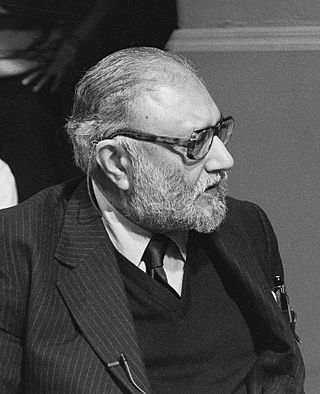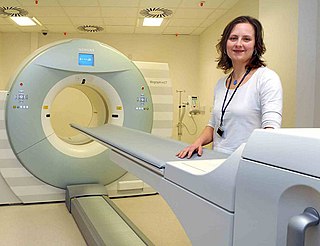Related Research Articles

Leon Max Lederman was an American experimental physicist who received the Nobel Prize in Physics in 1988, along with Melvin Schwartz and Jack Steinberger, for research on neutrinos. He also received the Wolf Prize in Physics in 1982, along with Martin Lewis Perl, for research on quarks and leptons. Lederman was director emeritus of Fermi National Accelerator Laboratory (Fermilab) in Batavia, Illinois. He founded the Illinois Mathematics and Science Academy, in Aurora, Illinois in 1986, where he was resident scholar emeritus from 2012 until his death in 2018.

Mohammad Abdus Salam was a Pakistani theoretical physicist. He shared the 1979 Nobel Prize in Physics with Sheldon Glashow and Steven Weinberg for his contribution to the electroweak unification theory. He was the first Pakistani and the first Muslim from an Islamic country to receive a Nobel Prize in science and the second from an Islamic country to receive any Nobel Prize, after Anwar Sadat of Egypt.

A soap bubble is an extremely thin film of soap or detergent and water enclosing air that forms a hollow sphere with an iridescent surface. Soap bubbles usually last for only a few seconds before bursting, either on their own or on contact with another object. They are often used for children's enjoyment, but they are also used in artistic performances. Assembling many bubbles results in foam.

Donald Arthur Glaser was an American physicist, neurobiologist, and the winner of the 1960 Nobel Prize in Physics for his invention of the bubble chamber used in subatomic particle physics.

Brian David Josephson is a Welsh theoretical physicist and professor emeritus of physics at the University of Cambridge. Best known for his pioneering work on superconductivity and quantum tunnelling, he was awarded the Nobel Prize in Physics in 1973 for his prediction of the Josephson effect, made in 1962 when he was a 22-year-old PhD student at Cambridge University. Josephson is the first Welshman to have won a Nobel Prize in Physics. He shared the prize with physicists Leo Esaki and Ivar Giaever, who jointly received half the award for their own work on quantum tunnelling.

Burton Richter was an American physicist. He led the Stanford Linear Accelerator Center (SLAC) team which co-discovered the J/ψ meson in 1974, alongside the Brookhaven National Laboratory (BNL) team led by Samuel Ting for which they won Nobel Prize for Physics in 1976. This discovery was part of the November Revolution of particle physics. He was the SLAC director from 1984 to 1999.

Nima Arkani-Hamed is an American-Canadian theoretical physicist of Iranian descent, with interests in high-energy physics, quantum field theory, string theory, cosmology and collider physics. Arkani-Hamed is a member of the permanent faculty at the Institute for Advanced Study in Princeton, New Jersey. He is also director of the Carl P. Feinberg Cross-Disciplinary Program in Innovation at the Institute and director of The Center for Future High Energy Physics (CFHEP) in Beijing, China.
Cyril Domb FRS was a British-Israeli theoretical physicist, best known for his lecturing and writing on the theory of phase transitions and critical phenomena of fluids. He was also known in the Orthodox Jewish world for his writings on science and Judaism.

Joel Louis Lebowitz is a mathematical physicist widely acknowledged for his outstanding contributions to statistical physics, statistical mechanics and many other fields of Mathematics and Physics.
Hongjie Dai is a Chinese–American nanotechnologist and applied physicist. He is the J.G. Jackson & C.J. Wood Professor of Chemistry at Stanford University. A leading figure in the study of carbon nanotubes, Dai is ranked as one of the top chemists in the world by Science Watch. He is currently the scientific advisor and co-founder to Nirmidas Biotech, Inc., which aims to commercialize his breakthrough research on NIR-II dyes and plasmonic gold (pGOLD) to applications in healthcare and in vitro diagnostics.

The Max Born Medal and Prize is a scientific prize awarded yearly by the German Physical Society (DPG) and the British Institute of Physics (IOP) in memory of the German physicist Max Born, who was a German-Jewish physicist, instrumental in the development of quantum mechanics. It was established in 1972, and first awarded in 1973.
Arthur Guy Zajonc is a physicist and the author of several books related to science, mind, and spirit; one of these is based on dialogues about quantum mechanics with the Dalai Lama. Zajonc, professor emeritus at Amherst College as of 2012, has been teaching there since 1978. He has served as the General Secretary of the Anthroposophical Society in America. From January 2012 to June 2015 he was president of the Mind and Life Institute.

Fay Ajzenberg-Selove was an American nuclear physicist. She was known for her experimental work in nuclear spectroscopy of light elements, and for her annual reviews of the energy levels of light atomic nuclei. She was a recipient of the 2007 National Medal of Science.

Jean Ellen Taylor is an American mathematician who is a professor emerita at Rutgers University and visiting faculty at the Courant Institute of Mathematical Sciences of New York University.
Mohammad Sajjad "Saj" Alam was a Bengali Pakistani and a naturalized American particle physicist. His work focused on particle physics and computational physics. He played a significant role in several major particle physics experiments that led to new discoveries in the area of high-energy particle physics.

Sam Aronson is an American physicist, formerly president of the American Physical Society in 2015 and also formerly the director of the Brookhaven National Laboratory from 2006 to 2012.

Heather Ann Williams is a British medical physicist working as a Consultant Medical Physicist for Nuclear Medicine at The Christie NHS Foundation Trust. She is also a lecturer in the Faculty of Biology, Medicine and Health at University of Manchester, as well as the University of Salford and University of Cumbria.
References
- ↑ Faculty directory, University of Kent, retrieved 2012-07-04.
- ↑ Kent professor Dr Cyril Isenberg cleans up with soap suds theory, KentOnline, 12 June 2012.
- ↑ Isenberg, Cyril (1976), "The soap film: an analogue computer", American Scientist , 64 (5): 514–518, Bibcode:1976AmSci..64..514I, JSTOR 27847462 . Reprinted in American Scientist, May–June 2012, doi : 10.1511/2012.96.1.
- 1 2 3 Kent Physicist awarded MBE, University of Kent Faculty of Sciences, February 2008, retrieved 2012-07-04.
- ↑ "Institute of Physics", The Independent , 29 January 1994, archived from the original on 25 January 2013.